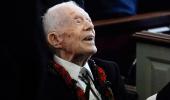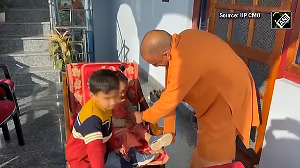Carter was in politics, but not a politician, certainly not a transactional politician.
Carter bears not a small resemblance to another leader of another large country, who was also in politics but not a politician, points out Shreekant Sambrani.

I was visiting the United States in the spring of 1977. James Earl Carter Jr, the 39th president, had been in office barely three months.
Not much was known about him at that time, except that he had been the governor of Georgia prior to winning the presidency and was a peanut farmer from Plains, a small 'city,' as it is officially called, even though just about 500 souls call it home.
From what little I had heard and read about him at that time, I thought that he was a fine, moral person.
I shared this view with my mentor, Professor Chandler Morse of Cornell University, himself the very model of rectitude.
He readily agreed with me, even as he wondered how someone living at the other end of the world could come to this judgment.
History shows that Professor Morse and I were completely correct in our assessment of this rare human being, who passed away recently at the age of 100.
Being the only centenarian among American presidents and leading an active and illustriously productive life for 43 years after his tenure at the White House ended, though remarkable by themselves, are the least of his many exemplary achievements.
But to put them in perspective, we must begin with a quick overview of his career. After a none-too-remarkable education, Jimmy (as he was universally addressed and he preferred it, too) Carter joined the United States navy in 1947 and served for six years.
Although later publicists claimed that he had a great naval career, he was only a lieutenant when he left active service (he remained as reserve officer for 16 years thereafter).
He was elected governor of Georgia in 1971 and served in that position until 1975.
The next year, he won first the Democratic nomination for president and later the presidency itself; he was the proverbial dark horse, winning both the nomination and the election against heavy odds.
He chose to run for re-election in 1980, overcoming Senator Edward Kennedy's challenge for renomination, but was routed in the election by the enormously popular Republican nominee, Ronald Reagan.
When General Dwight Eisenhower ran for president in 1952 and 1956, it was said that even God would have lost to him. That quip applies equally well to Reagan's campaigns in 1980 and 1984.

Carter was the ultimate outsider in American politics. He was not a member of any political dynasty. He was a man of very modest means.
He did not have an illustrious military career, neither was he a part of the Beltway elite, having not been a member of either Houses of Congress or the administrative-lobbying establishment.
He was just a plain one-term governor of a relatively unimportant state, which had little headline impact.
His only notable achievement, was a win, and a narrow one at that, over the incumbent president, Gerald Ford, who is the only unelected occupant of the White House, having run for neither the presidency nor the vice-presidency earlier.
When Carter became president, the Cold War with the then USSR was not at its peak, but was still the most important major international issue.
That ensured that the arms race between the two superpowers engaged their respective heads' critical attention.
Race relations within the US had become a bit calmer after the explosive previous decade, but were still just a spark away from flaring up.
The biggest issue before the US, as indeed the whole world, was the energy crisis following the oil shock administered by the OPEC countries in 1973, which comprised unprecedented hikes in oil prices and the embargo on oil shipments to supporters of Israel imposed by Arab members of OPEC.
The world had so far taken oil to be plentiful and cheap. It now realised that such was not the case.
Oil became black gold, whose flows and prices could be controlled by a handful of countries, mostly ruled by potentates.
The global economy was in doldrums and the US was no exception. For the first time since World War II ended, Americans nursed doubts and fears about the economic muscle of their country and the almighty dollar.

Carter brought his systematic mind to address the situation. Early on in his term in office, in April 1977, he addressed Americans, calling the energy crisis 'the moral equivalent of war'.
He created a new Department of Energy and staffed it with enthusiastic young professionals.
He emphasised economy in energy consumption at household and personal levels, urging his country to set thermostats lower.
He did so in the White House and began appearing in cardigans rather than in shirtsleeves.
The new department pressed the American auto industry for energy-efficient vehicles and started setting goalposts for desirable levels of mileages for vehicles, making them less of gas guzzlers.
His energy conservation programme, comprising comprehensive measures for all activities, faced problems of Congressional approvals.
The House of Representatives passed measures the administration had recommended, but the Senate balked. Convinced of the rectitude of his plans, Carter refused to compromise.
In fact, he assumed an adversarial stance with the Congress and the tensions between the two branches of government mounted.
Soon, Carter began to be pilloried for his rigidity, which to him was his ethical duty. People who had first applauded his sharp criticism of expense account three martini lunches now started to ridicule him.

The economy showed signs of recovery from the stagflation it faced in the Ford administration thanks to the Carter stimuli. But that proved short-lived and by 1979, it was back again in a similar situation.
By that time, the energy situation had reached crisis proportions not just because of the recalcitrance of the American Congress, but also because other leading industrial economies did not toe the line.
It is to be noted that most of the actions the Carter administration had proposed but failed to get approved are now standard practices in most countries.
The Carter administration appointed another former Cornell Professor Alfred E Kahn chairman of the Federal Aviation Administration.
He initiated the deregulation of the airline industry. Carter also salvaged Chrysler, one of the three giants of Detroit, from insolvency by offering it a bail-out package.
This became the template for similar actions after the 2008 meltdown, which helped the American auto industry recover and regain momentum
Carter had shown great moral courage in handing back the control of the Panama Canal to Panama.
Since its inauguration in 1914, the Canal and two narrow strips of land on its either side had remained under the control of the US, which had built it.
The Canal Zone was treated as a US territory, much like Samoa and Puerto Rico. The Canal is now back in the news again, as the once and future President Donald Trump has talked of taking it back, by use of force if needed.
Carter also took the lead in brokering peace in West Asia. He goaded the then president of Egypt, Anwar el-Sadat and the Israeli prime minister Menachim Begin into signing a peace accord in a meeting he hosted in September 1978.
The Camp David Accord, as it came to be known, resulted in Egypt recognising Israel and establishing diplomatic ties with it in return for Israel signing a peace agreement the next year and returning to Egypt the Sinai peninsula it had seized in 1956.
While this was far from a lasting peace in the region as we know only too well, the Accord has lasted for nearly five decades, the only semblance of reduced belligerence between two formerly hostile parties. Sadat and Begin were jointly awarded the Nobel Peace Prize.
This is again a hot spot now. Trump has just threatened that all hell will break loose if the Palestinians do not toe the Israeli line.

Carter grew more distant not only from Congress but the American public as well, reaching in 1979-1980 what were then the lowest approval ratings of any president.
To add to his cup of woes, the mullahs who had overthrown the Shah of Iran and now ruled the country, encouraged a group of students to seize the American embassy in Tehran on November 4, 1979 (exactly a year before the American presidential elections) and held 52 American diplomats and citizens hostages for the next 14 months, until shortly after President's assumption of office in January 1981.
Carter had earlier called the Shah his personal friend and Iran an island of stability under him. He refused to negotiate with the captors and the Iranian theocracy. He stayed put in the White House for the next three months.
The American public got impatient and clamoured for action to free the hostages. Carter initially refused to take any action that might entail loss of life. He felt rigorous sanctions against Iran might work.
When that didn't happen, he finally authorised in April 1980 Operation Eagle Claw to free the hostages. But that failed, resulting in the loss of aircraft and deaths of several service personnel.
That caused Carter's already low stock of public confidence to further plummet. It also wiped out whatever slender chances he had of being re-elected. Reagan won by a landslide.
Two later revelations show how fate had conspired against Carter. First, Reagan sent private feelers to the Iranian ayatollahs not to give in to any Carter initiatives, through the infamous Iran-Contra scandal helmed by Colonel Oliver North.
The second disclosure by the CIA after the mandatory 30-year lock-in described how Ayatollah Khomeini was hell-bent on destroying the Carter presidency and gladly accepted the Reagan proposal.
The hostages were freed almost as soon as Reagan was sworn in as president in January 1981.

Carter returned to Plains, not dejected but content with what he had achieved as president.
He was 57 years old at that time, but he did not go into semi-retirement, supervising the building of the customary presidential library or writing memoirs and riding the lecture circuit for handsome fees as other former presidents before and after him did.
He put his peanut farm in order, resumed his carpentry and Sunday school teaching, but far more importantly, became a champion of peace all over the world.
In the next three-and-a-half decades, he took up countless missions to trouble-spots in far corners of the globe.
With famines -- both natural and man-made -- and civil strife claiming thousands of lives and causing untold miseries, tinpot autocrats rigging elections and terrorists wreaking havoc, the world was not lacking in fraught places and people sorely in need of healing touches.
Carter became an angel of mercy, supervising an election here, brokering peace between warring groups there and arranging relief supplies in-between.
He was not appointed as such, but he became America's ambassador extraordinary of goodwill. Age became just a number for him as he continued his missions tirelessly.
Recognition came his way by way of the Nobel Peace Prize in 2002, more than two decades after he had left office.

He had a remarkable partner in his wife Rosalynn Smith Carter. They were married in 1946. That marriage lasted 77 years, until Rosalyn's death in 2023.
Theirs was the longest presidential marriage, longer than that between George H Bush and Barbara Bush.
The Carters were partners in politics as well. Long before the Clintons and the Obamas, the Carters were buy-one-get-one-free co-parceners in the White House.
It was unusual at that time for the First Lady to attend cabinet meetings, but Rosalynn did and got more then her fair share of the blame for the many perceived wrong turns of the Carter administration.
Carter said in an interview with Playboy during the 1976 campaign, 'I've looked on a lot of women with lust. I've committed adultery in my heart many times.'
Such was the state of public morality in those days that this statement of pure honesty and candour caused considerable outrage among the gentry. But there was never any doubt about his fidelity to Rosalynn, leave alone Clintonesque incriminating incidents.

The Carters aged gracefully and went into hospice care together in 2022. Carter said after Rosalynn's death:
'Rosalynn was my equal partner in everything I ever accomplished. She gave me wise guidance and encouragement when I needed it. As long as Rosalynn was in the world, I always knew somebody loved and supported me.'
A statement that resonates particularly well with this writer.
One can now see that Carter and Trump are polar opposites of each other and not just on the Panama Canal or West Asia issues.
Yet they both ended up being presidents of the United States. As the song in West Side Story goes, Only in America!
It is customary not to speak ill of the dead. That has not been my intention in writing this column.
I have dwelt on Carter's many perceived failures. But one thing stands out: Carter was in politics, but not a politician, certainly not a transactional politician. He seldom made deals, unlike the man who will occupy the White House in two weeks' time who wrote the book, literally, on the art of dealmaking.
In this, Carter bears not a small resemblance to another leader of another large country, who was also in politics but not a politician.
He too stood for his principles even when that earned him popular opprobrium. He offered salve to the many troublespots in his large country torn by sectarian violence. And he freely admitted his faults, including those that had a bearing on his morals. His name was Mohandas Karamchand Gandhi.
Carter called America not a melting pot but a mosaic, where individual pieces retained their identity and yet complemented each other, creating a beautiful artefact.
That is something leaders of India, a polyglot entity of multiple ethnicities and cultures, should remember, instead of forcibly imposing one nation one this that and the other iron grip on the land.
By the time this is read, James Earl Carter Jr, the thirty-ninth president of the United Staes would have been laid to rest with a State funeral in Washington, DC.
Call it an irony, or a concession to contemporary reality, that this simple, plain-speaking from a most felicitously named place who shunned ostentation of any kind, should have been sent off on his final journey with all the pomp and ceremony befitting the mighty office he once graced.
Photographs curated by Manisha Kotian/Rediff.com
Feature Presentation: Rajesh Alva/Rediff.com










 © 2025
© 2025